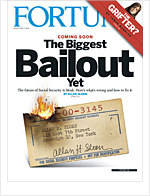TALKING BIZ NEWS EXCLUSIVE
Allan Sloan, senior editor at large for Fortune magazine, is the top business journalist of the past decade, according to an unscientific, subjective review by Talking Biz News.
Sloan, who has won seven Gerald Loeb Awards, was picked over colleague Carol Loomis of Fortune and Bethany McLean, formerly of Fortune and now with Vanity Fair, Gretchen Morgenson and Floyd Norris of the New York Times, Mark Pittman of Bloomberg News, Mark Maremont and Dennis Berman of The Wall Street Journal, Binyamin Applebaum of the Charlotte Observer, Boston Globe and Washington Post, and Alan Abelson of Barron’s.
The first-time award considered only business journalists who report and write.
No business journalist beside Sloan has won more than three Loeb Awards, and Sloan is the most decorated business journalist ever. Despite nearing the end of his nearly 40-year-career in journalism, he continues to pile up awards for his analysis and reporting of business and economic issues. His writing is concise and can be clearly understood by anyone.
 As a bonus, he’s also witty in his writing, and Sloan is involved in many business journalism causes.
As a bonus, he’s also witty in his writing, and Sloan is involved in many business journalism causes.
“The thing that strikes me about Allan is that the fire still burns as fiercely as ever,” Fortune managing editor Andy Serwer told Talking Biz News on Thursday. “He has other outstanding qualities: He is razor sharp, he is as good with numbers as any journalist I have ever worked with, and he is exceptionally generous when it comes to working with others on our staff, especially junior writers and reporters.
“But what is most impressive is that he still brings the same passion to his job that he did decades ago. Maybe even more so. The latest financial meltdown was custom-made for Allan’s journalism, and he has really done incredible work since coming to Fortune three years ago. It has been a new Golden Age of Sloan.”
Earlier this year, Sloan wrote about the perils of the Social Security system, and he slammed General Motors for closing its Saturn division. He’s also not above telling readers when he was wrong.
Sloan most recently won a Loeb Award in 2008Â in the commentary category for a column called Piece of Junk. You can read it here.
The judges stated, “Of the countless stories about the subprime crisis, this piece stood out among the rest in depth of reporting and quality of writing. By dissecting one subprime mortgage deal, Sloan said volumes in relatively few words about what happened and why. The story turned a spotlight on the underlying conflict on Wall Street, as firms sold questionable subprime debt to investors even as they were profiting by shorting similar investments.”
In 2007, Sloan correctly predicted that News Corp. CEO Rupert Murdoch would be successful in his bid to acquire Dow Jones & Co., and after the deal ended, he found a unnoticed aspect to the transaction that allowed the Bancroft family to defer their taxes, making it sweeter for them than originally reported.
 Sloan joined Fortune in July 2007. He was previously Newsweek’s Wall Street editor for 12 years. The same year, writing for Newsweek, he warned about how Wall Street thought it had eliminated risk from investing.
Sloan joined Fortune in July 2007. He was previously Newsweek’s Wall Street editor for 12 years. The same year, writing for Newsweek, he warned about how Wall Street thought it had eliminated risk from investing.
Back in 2003, again writing for Newsweek, Sloan warned that the Sarbanes-Oxley legislation designed to eliminate corporate fraud had not closed all of the loopholes. Wall Street Journal money & markets editor Dave Kansas earlier this decade called Sloan “totally fearless” in going after companies and unscrupulous behavior.
Loeb has won Loebs in three different categories in three different decades for five different employers. He has won Loeb awards at Newsweek, Forbes, and the Detroit Free Press, and two at Newsday, where he also won the John Hancock Award for excellence in business and financial journalism. He won a Loeb Award for Newsweek in 1998 and for Newsday in 1992 and 1993.
Earlier this year, Sloan receive the Elliott V. Bell Award from the New York Financial Writers Association. The award is named for a former BusinessWeek editor who was one of the founders of the organization, and it recognizes a person’s long-term contributions to financial journalism.
In 2002, Sloan wrote the following in Newsweek about the perils of mergers and acquisitions: “By contrast, many companies try to grow via big acquisitions. These deals are seductive, because you get lots of favorable ink and a love buzz from Wall Street. You also buy time to implement your strategy, if you actually have one, because year-to-year financials aren’t comparable and outsiders can’t analyze your results.”
Any business journalist who can get the phrase “love buzz” into a mainstream publication — in a business story no less — deserves some kind of recognition.





